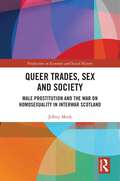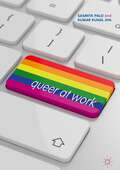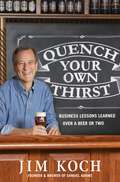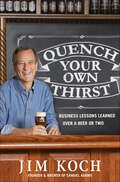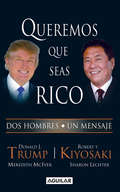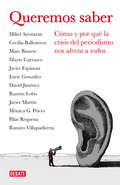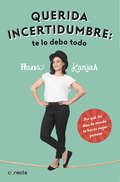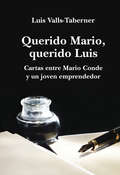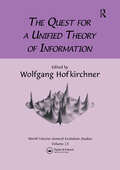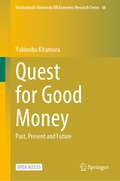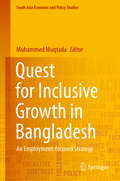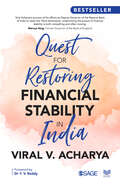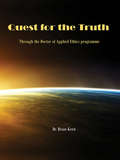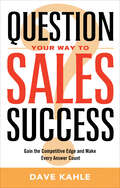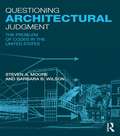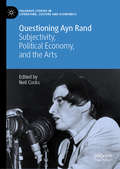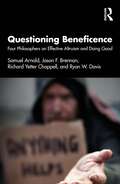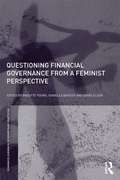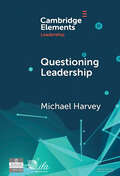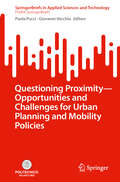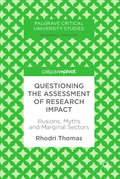- Table View
- List View
Queer Trades, Sex and Society: Male Prostitution and the War on Homosexuality in Interwar Scotland (Perspectives in Economic and Social History)
by Jeffrey MeekThis book is the first scholarly work to explore male homosexual prostitution in interwar Scotland. The male prostitute occupies a contested position within interwar society – depending on the perspective he was representative of a descent into turpitude, of tenacious organised criminality or of exploitation. The book explores connections between male prostitution and criminal gangs prevalent during the interwar period, by detailing the emergence and activities of Glasgow’s notorious ‘Whitehats’, a gang composed of a number of queer male prostitutes and led by William Paton. This book discovers that although Paton’s activities were representative of a career criminal, the young men who joined the ‘Whitehats’ were often driven by poverty and social isolation. This book explores the experiences of Edinburgh police detective William Merrilees and his war on homosexuality in Edinburgh during the 1930s through examining the tactics used to regulate homosexual trade and the implications this held for the men involved. The book not only explores the attitudes, opinions and actions of police officers, politicians and the legal process but also uncovers fragments from the lives of the men involved, through personal reflections and letters. The book explores the anxieties that the trade in homosexual sex provoked, not just for understandings of sexuality but also of gender and nationhood, and offers a comparative perspective of the forms of homosexual trade in Scotland, England and major foreign cities. This book will have broad appeal to academics and students in the field of social, sexual and gender history as well as the social and criminal histories of Scotland and Britain.
Queer at Work
by Sasmita Palo Kumar Kunal JhaThis book uses narratives collected over a period of four years, detailing the stereotypes and stigmas attached to LGBTQ employees at the workplace in India, and it allows their voices to be heard. Further, it explores the strategies used by individuals from the LGBTQ community to pass on or reveal information related to their non-normative sexual orientation and gender identity at their workplace, and the way these strategies differ for individuals who are formally or informally 'out' as compared to those who are still in the closet or have come out to only a few people at their organization. The book emphasizes the need to study the flow of information and stigma management strategies in the context of current technological advancements, and discusses the extent to which organizations succeed in providing 'safe spaces' for employees from the LGBTQ community in India. Also addressing the impact of the Supreme Court verdict on Section 377 of the IPC and the NALSA verdict on LGBTQ individuals at the workplace, the book not only provides tools to help organizations assess their workplace climate with regard to LGBTQ inclusion and diversity, but also outlines the criteria that would lead to queer-friendly and gender-neutral work environments.
Quench Your Own Thirst: Business Lessons Learned Over a Beer or Two
by Jim KochFounder of The Boston Beer Company, brewer of Samuel Adams Boston Lager, and a key catalyst of the American craft beer revolution, Jim Koch offers his unique perspective when it comes to business, beer, and turning your passion into a successful company or career. This book offers an insight into Koch's whirlwind ride to the top of craft brewing.
Quench Your Own Thirst: Business Lessons Learned Over a Beer or Two
by Jim KochNATIONAL BESTSELLER and named a 2016 Best Book of the Year by Inc., Business Insider, and ForbesFounder of The Boston Beer Company, brewer of Samuel Adams Boston Lager, and a key catalyst of the American craft beer revolution, Jim Koch offers his unique perspective when it comes to business, beer, and turning your passion into a successful company or career.“Boston Beer’s Jim Koch offers readers a six-pack of wisdom.” – The Boston GlobePull up a chair and crack open a Sam Adams. It’s time to leave behind business as you know it.Quench Your Own Thirst covers everything from finding your own Yoda to Koch’s theory on how a piece of string can teach you the most important lesson you’ll ever learn about business. Koch also has surprising advice on sales, marketing, hiring, and company culture. His anecdotes, quirky musings, and bits of wisdom go far beyond brewing. A fun, engaging guide for building a career or launching a successful business, Quench Your Own Thirst is the key to the ultimate dream: being successful while doing what you love. So, are you quenching you own thirst – or someone else’s? "Like Steve Jobs, Bill Gates, Larry Ellison, and the other greats, Jim Koch's entrepreneurial journey is motivated by a deep commitment to making superb products and building a unique culture that reinforces innovation and risk-taking. This book tells a compelling story about how he did it. The lessons will be invaluable for anyone starting a business or building a career." —Bill Hambrecht, co-founder or Hambrecht & Quist and chairman of WRHambrecht + Co
Queremos que seas rico
by Robert T. Kiyosaki Donald J. TrumpEn Queremos que seas rico, dos exitosos empresarios, Donald Trump y Rober T. Kiyosaki, brindan consejos para todo aquel que acaba de comenzar su propia empresa y quiere triunfar. De Robert T. Kiyosaki, autor de los bestsellers: Padre Rico, Padre Pobre, el libro #1 de finanzas personales de The New York Times por más de seis años; Niño rico, niño listo, Segunda oportunidad, entre otros . Donald Trump y Robert T. Kiyosaki se unen para decirle a los emprendedores cómo ser exitosos. No es necesario tener dinero para resolver los problemas financieros, éstos sólo se solucionan con una educación financiera adecuada. Es imprescindible que las personas adquieran conciencia sobre su futuro económico y no esperen que dependa de sus gobiernos, sus empleadores o sus familias. En este libro, dos exitosos empresarios y educadores hacen mancuerna para abordar este desafío y ofrecer respuestas contundentes y clarasa las preguntas que todo emprendedor se formula antes y después de iniciar una empresa: cómo volverse rico; cómo invertir para ganar; cuáles son las ventajas de los inversionistas que los ahorradores no poseen y cómo elegir el campo de inversión apropiado.
Queremos saber
by Varios AutoresLa crisis económica general ha coincidido en el tiempo con una crisis propia de los medios de comunicación y por tanto del periodismo, obligado a adaptarse a la nueva realidad digital. Como en toda crisis, se corre el riesgo de recortar cosas fundamentales, y conservar otras accesorias: suprimir lo más caro, no lo menos necesario. En un medio lo más caro es la información internacional propia de calidad, por eso en esa sección se pueden ver aumentados los problemas y los desafíos del periodismo.
Queremos saber: Cómo y por qué la crisis del periodismo nos afecta a todos (Libros para entender la crisis #Volumen)
by Varios AutoresEn Queremos saber, doce periodistas de una amplia trayectoria internacional reflexionan sobre la crisis que está atravesando el periodismo y explican las nefastas consecuencias que eso tiene para el correcto funcionamiento de una democracia. La crisis económica general ha coincidido en el tiempo con una crisis propia de los medios de comunicación y por tanto del periodismo, obligado a adaptarse a la nueva realidad digital. Como en toda crisis, se corre el riesgo de recortar cosas fundamentales, y conservar otras accesorias: suprimir lo más caro, no lo menos necesario. En un medio lo más caro es la información internacional propia de calidad, por eso en esa sección se pueden ver aumentados los problemas y los desafíos del periodismo. Reseñas:«No recuerdo cuándo, exactamente, explicar en la redacción la importancia de la historia vivida, relatada en forma de reportaje, se convirtió en una tarea más ardua que atravesar fronteras, esquivar ataques, granjearse la confianza de combatientes y civiles, y superar el miedo para convertirse así en testigo directo de los hechos. En mi opinión, eso marca el momento de la crisis existencial del periodismo.»Mónica G. Prieto «Hoy más que nunca los periódicos deberían apostar por las historias propias, los reportajes, y olvidarse de un concepto que sí que se ha quedado anticuado debido a internet, la noticia de ayer.»Javier Espinosa «El corresponsal ha dejado de tener sentido si no es para ofrecer profundidad frente a la inmediatez, precisión frente a la falta de rigor, reporterismo literario frente a la escritura urgente y originalidad frente al rebaño que hemos formado los medios de comunicación.»David Jiménez «El buen periodismo seguirá siendo propiedad de los buenos periodistas, de aquellos que prefieran formular preguntas incómodas a escribir al dictado, que indaguen en el origen, buceen en las causas y sepanleer entre líneas, sin importar el tipo de plataforma que se utilice.»Javier Martín «Si renunciamos a enviar periodistas a los sitios, no ya a Afganistán, sino a la calle de enfrente; si creemos que una pantalla de ordenador o de una tableta, por muy HD y táctil que sea, puede reemplazar el olor, el color, el miedo, la soledad, las voces y sus silencios, habremos matado el reportaje y el periodismo. Seremos innecesarios, sólo puro entretenimiento.»Ramón Lobo «Pese a la efervescencia de internet, son los medios poderosos los que deciden de qué se habla y de qué no. [...] Cualquier guerra, cualquier genocidio, es peor cuando falta información.»Enric González
Querida incertidumbre: Por qué los días de mierda te hacen mejor persona
by Hana KanjaaCombinando el relato conmovedor con el humor y una lúcida capacidad de reflexión, Hana Kanjaa te acompañará en un viaje trepidante que no te dejará indiferente. ------- ¡Tres, dos, uno... vamos!Caída libre.En ese momento vi cómo el suelo se acercaba a una velocidad trepidante... Cuatro segundos después, al abrir el paracaídas, un golpe de viento hizo que la autora de este libro se estrellara contra la pared del Peñón de Ifach, a ciento cincuenta metros de altura, donde resistió varias horas con la vida pendiendo de un hilo... Una experiencia trascendental que cambiaría la manera de entender la vida de esta hija de inmigrantes marroquíes. ------- Solo hay algo peor que sentirse mal: sentirse mal y fingir que todo está bien. Y es que cada vez nos lo ponen más difícil. Las redes sociales y los medios de comunicación nos bombardean constantemente con estándares imposibles de alcanzar y nos lanzan el mensaje de que solo lo perfecto es aceptable. Y como esa perfección nunca llega, la vida se convierte en una rueda de hámster de insatisfacción y angustia permanentes. Salir de esa rueda y disfrutar de la vida es posible, pero para eso tendrás que atreverte a explorar otros caminos, menos transitados, que incluyen todo aquello que solemos evitar: los cambios, la incertidumbre, la incomodidad, el dolor... Con planteamientos prácticos y sencillos, en Querida incertidumbre descubrirás: - Cómo convertir el miedo en un elemento imprescindible del bienestar. - Por qué la felicidad está siempre donde menos la esperas y dónde encontrarla. - Cómo aprovechar el pensamiento negativo para sentirte mejor que nunca. Un libro de contagiosa energía que invitaa estrenar una nueva vida... extraordinariamente normal.
Querido Mario, querido Luis
by Luis Valls-TabernerQuerido Mario,Estoy en un momento en el que no sé exactamente lo que quiero hacer con mi vida. Pero sí tengo cada vez más claro lo que no quiero hacer. Ya sabes que me gustaría demostrarme y demostrarte que han sido bien invertidos tus consejos.LuisQuerido Luis,Si quieres ser empresario, adelante. Si quieres ser funcionario, adelante. Si tienes vocación de una cosa u otra, adelante. Pero situando lo instrumental en su propio plano. Un empresario de gigantesco éxito en lo material puede ser un hombre fracasado en su dimensión vital. De hecho, este escenario se da con mucha, con demasiada frecuencia. Te dije que en mi vida pasada siempre sostuve que un hombre no son sus cosas, sean la abogacía del Estado, el despacho de abogados, la industria farmacéutica o Banesto; también son cosas la cárcel y los juicios, las condenas y las absoluciones. Así que las cosas se guardan en alacenas, pero no se vive con ellas, no se duerme con ellas, ni se vive para ellas.Mario
Quest For A Unified Theory: Proceedings Of The Second International Conference On The Foundations Of Information Science
by Wolfgang HofkirchnerFirst published in 1999. Volume 13 in the 13-volume set titled World Futures General Evolution Studies with a common focus of the emerging field of general evolutionary theory. This volume will expand across disciplines where scholars from new fields will contribute books that propose general evolution theory in novel contexts. The essays are structured with five topics: Approaches to Unification; Concepts of Information; Self-Organizing Systems; Life and Consciousness; Society and Technology.
Quest for Good Money: Past, Present and Future (Hitotsubashi University IER Economic Research Series #48)
by Yukinobu KitamuraThis open access book examines the history and role of money. Money is often defined in terms of three interrelated functions: as a medium of exchange, store of value and unit of account. Researchers frequently discuss the first two functions, but tend to ignore unit of account. This book focuses on how a unit of account or denomination can be defined and can be derived from the monetary system. In the case of paper money and coins, we know how to determine the denomination of money based on the problem of the least number of weights defined by Bâchet and proved by Hardy and Wright (1960). However, in the case of digital or cryptocurrency, denomination may not matter because digital or cryptocurrency uses a wallet that is essentially denomination free: a wallet can contain any amount of currency without upper and lower limits. When people talk about the stablecoin, i.e. the stable price of digital and cryptocurrency with the major legal tender, they take a unit of account or denomination of digital or cryptocurrency as given. This arrangement destroys the nature of denomination free or decentralized autonomy as it were. Exploring how we can consolidate with these two views of denomination, this book will appeal to anyone interested in creating new digital or cryptocurrencies. It also serves as a textbook on central bank digital currency.
Quest for Inclusive Growth in Bangladesh: An Employment-focused Strategy (South Asia Economic and Policy Studies)
by Muhammed MuqtadaThis book offers a selection of intensely researched essays focused on the critical planning objectives and policy priorities that would enhance the promotion of inclusive growth in a developing country. It has taken Bangladesh as the case study. It argues for rethinking of traditional policies and provides arguments and ways to reorient these toward inclusive growth and better social inclusion. These involve a dedicated focus on employment and inclusion in the design of monetary and fiscal policies, trade and industrial policies, policies toward rural non-farm employment, social protection and safety net strategy and the nature of institutional and governance reforms which are imperative for ensuring inclusive growth. The studies included in the book were prepared before or at the onset of the ongoing COVID-19 pandemic and the unfolding economic crisis; yet they provide cursory observations on its likely impact, and underscore how the stated principles and policies of an inclusive growth strategy have become even more significant in the present situation. Bangladesh has been growing respectably during the past decade and a half and has arguably shown strong progress in several social indicators. However, inequality and vulnerability are rising alarmingly, and the economy is beset with high levels of corruption, as well as with various other governance deficits that can adversely affect future growth and social inclusion. The book provides a critical assessment of how far growth in Bangladesh has been inclusive, both over time, and in comparison to selected South and Southeast Asian countries. It constructs a specific ‘inclusive growth index’ with reference to what the study considers as the significant goals and pillars of inclusive growth. Bangladesh is not the only developing country that is faced with the arduous task of tackling unbalanced economic growth and of implementing the 2030 Agenda. Rising vulnerability, inequality, disappointing job growth and poor governance are also major challenges to inclusive growth for many countries in the Global South. Therefore, the appeal of this book extends well beyond the borders of Bangladesh and the South Asian region. Corresponding to SDG 8, the book is aimed at academia, researchers, policymakers, civil society leaders as well as other national and international development practitioners with an avid interest in issues concerning growth with equity, and in sync with the 2030 Agenda for Sustainable Development. In addition, the book is a valuable resource for interested students of disciplines related to economics and development policy.
Quest for Power: European Imperialism and the Making of Chinese Statecraft
by Stephen R. HalseyChina's late-imperial history has been framed as a long coda of decline, played out during the Qing dynasty. Reappraising this narrative, Stephen Halsey traces the origins of China's current great-power status to this so-called decadent era, when threats of war with European and Japanese empirestriggered innovative state-building and statecraft.
Quest for Restoring Financial Stability in India
by Viral AcharyaBeyond the headline-grabbing issues, the Indian economy is struggling to solve a critical problem: How to restore and maintain financial stability on a durable basis. In this book titled, Quest for Restoring Financial Stability in India, Former Deputy Governor of RBI, Dr. Viral V. Acharya, talks about his quest for restoring financial stability in India and offers a concrete plan for sustained improvement. Dr Acharya shares a feasible plan to address the recapitalization needs of public sector banks, offering solutions on how to improve credit allocation by credit intermediaries and establish viable and efficient capital markets. Elucidating the need-of-the-hour reforms, this book also raises several stark and unanswered questions related to the re-emergence of fiscal dominance in India, not just of monetary policy tools but also of banking regulations. It makes a persuasive case for striking the right balance between the government, centralbank, private sector and markets, in order to improve long-run growth prospects for the real economy.
Quest for the Truth Through the Doctor of Applied Ethics programme
by Dr Brian KeenThis is your invitation to participate in the Quest for the Truth. This is one of the greatest quests in the world since the Truth is an absolute necessity. This is one of the greatest challenges for you today. As the author, I'm inviting you to join me in this Quest. The Truth isn't a concept. The Truth is a real goal for the benefit of all mankind. The Truth teaches us and challenges us. We learn to love through the Truth. You will learn the Truth utilizing the same methodologies as all scientists. Aside from the Doctor of Applied Ethics (DAE) degree programme there is no doctorate degree that allows the student to acquire the tools to diagnose the problems relating to an enterprise that uses scientifically-verifiable objective standards. The term enterprise represents any type of business or organization, including charitable ones or associations. The key is to live for the Truth. When you live for the Truth you will find this doctorate programme appropriate. Ethicists seek the Truth through Illumination in order to become a doctor who can diagnose and offer therapy to those who are hurting.
Question Your Way to Sales Success: Gain the Competitive Edge and Make Every Answer Count
by Dave KahleLearn the powerful questions to ask that separate the mediocre salespeople from the superstars.A good question is a salesperson’s most powerful tool, one that can be used in every stage of the sales process, from making appointments to closing the sale. Yet, most salespeople are ill-equipped to use this tool effectively. As a result, they deal with price issues, and wonder why the customer purchased from someone else. Question Your Way to Sales Success will transform the way you think and operate by offering specific, practical advice on how to ask better sales questions. A powerfully asked question . . .•Collects deeper and more detailed information about your customer•Makes your customer think about what you want him or her to think about•Creates the perception of your competence in your customer’s mind•Gains agreement from your customer—and clinches the deal
Question of Character (HBR Case Study and Commentary)
by Patrick Carnes Suzy Wetlaufer Freada Kapor Klein Daryl Koehn Mitchell Kapor Lisa A. Mainiero Burke StinsonFor the most part, Glamor-a-Go-Go's board has been thrilled with CEO Joe Ryan's performance. Ryan, after all, had transformed the private-label cosmetics company into a retail powerhouse with flashy outlets from New York to Los Angeles. In addition to saving the company from bankruptcy shortly after his arrival in 1992, Ryan had made Glamor-a-Go-Go a fun and exciting place to work, increasing workers' wages and creating boundless opportunities for anyone willing to work hard and think out of the box. He had also brought more women and people of color on board. And he had made many employees wealthy, with generous stock giveaways and options for the most senior employees down to the most junior. Glamor-a-Go-Go's stock price had grown tenfold during Ryan's tenure. But Ryan's personal affairs were beginning to call into question his leadership abilities. The local paper's gossip column recently ran a photo of Ryan--a married man--leaving a gala event with a beautiful young woman from the company, with the headline "Who's That Girl?" Indeed, rumors about Ryan's philandering were starting to take on a harsher edge. Some people believed his secretary left because Ryan had sexually harassed her. Others believed a mailroom employee had been promoted to factory supervisor because of her affair with the CEO. Having warned Ryan several times about his alleged infidelities, the board is stuck. What should it do about Ryan's extracurricular behavior? Does Ryan's personal behavior even affect the company? Is what Ryan does outside the office the board's concern? In 99511 and 99511Z, commentators Freada Kapor Klein, Mitchell Kapor, Burke Stinson, Patrick Carnes, Daryl Koehn, and Lisa A. Mainiero offer advice on this fictional case study.
Questioning Architectural Judgment: The Problem of Codes in the United States
by Steven A. Moore Barbara B. WilsonThe book shines light on the problem of judgment, particularly in the realm of architectural "technics" and the codes that regulate it. The struggle to define "sustainability," and thus judge architecture through such lenses, is but one dimension of the contemporary problem of judgment. By providing the reader with an inherently interdisciplinary study of a particular discipline—architecture, it brings to the topic lenses that challenge the too frequently unexamined assumptions of the discipline. By situating architecture within a broader cultural field and using case studies to dissect the issues discussed, the book emphasizes that it is not simply a matter of designing better, more efficient, or more stringent codes to guide place-making, but a matter of reconstructing the boundaries of the systems to be coded. The authors are winners of the EDRA Place-Research Award 2014 for their work on the Green Alley Demonstration Project used in the book.
Questioning Ayn Rand: Subjectivity, Political Economy, and the Arts (Palgrave Studies in Literature, Culture and Economics)
by Neil CocksQuestioning Ayn Rand: Subjectivity, Political Economy, and the Arts offers a sustained academic critique of Ayn Rand’s works and her wider Objectivist philosophy. While Rand’s texts are often dismissed out of hand by those hostile to the ideology promoted within them, these essays argue instead that they need to be taken seriously and analysed in detail. Rand’s influential worldview does not tolerate uncertainty, relying as it does upon a notion of truth untroubled by doubt. In contrast, the contributors to this volume argue that any progressive response to Rand should resist the dubious comforts of a position of ethical or aesthetic purity, even as they challenge the reductive individualistic ideology promoted within her writing. Drawing on a range of sources and approaches from Psychoanalysis to The Gold Standard and from Hannah Arendt to Spiderman, these essays consider Rand’s works in the context of wider political, economic, and philosophical debates.
Questioning Beneficence: Four Philosophers on Effective Altruism and Doing Good
by Jason F. Brennan Richard Yetter Chappell Ryan W. Davis Samuel ArnoldEffective Altruism is a movement and a philosophy that has reinvigorated the debate about the nature of beneficence. At base, it is the consistent application of microeconomic principles to beneficent action. The movement has exposed that many forms of giving do little good (or do active harm), but others do tremendous good.Questioning Beneficence uses Effective Altruism as a launch pad to ask hard questions about beneficence more generally. Must we be Effective Altruists, or are Effective Altruism and the ideas driving the movement a mistake? How much should we give—if anything— and how should we give it? What are the respective roles of different kinds of institutions? Is charity anti-democratic and do billionaire philanthropists have too much power? Is Effective Altruism just utilitarianism in disguise?Questioning Beneficence is written by four philosophers, each with distinct points of view. It introduces a new standard for debating ideas in philosophy as each author poses and answers three questions and each of his three co-authors responds to those questions in turn. Finally, the first author replies to his co-authors’ responses. Throughout the book, there is a spirit of curiosity, intellectual risk taking, and truth-seeking, rather than point-scoring and one-upmanship. This book demonstrates what open-minded, real dialogue on an important issue can be at its very best.Key Features: Introduces a new roundtable format for philosophical debates: each of four authors takes the lead in constructing and answering three questions, each co-author then responds, and the first author then replies to the others’ responses. Explores salient philosophical questions raised by beneficence, like Can philanthropy be undemocratic? Why are people so bad at charity and what can we do about it? How important is beneficence compared to other values? Can Effective Altruism be part of a meaningful moral life? Consistently written in a clear and engaging style, suitable for both undergraduate students and curious general readers
Questioning Credible Commitment
by Larry Neal D'Maris Coffman Adrian Leonard D'Maris Coffman Adrian LeonardFinancial capitalism emerged in a recognisably modern form in late seventeenth- and eighteenth-century Great Britain. Following the seminal work of Douglass C. North and Barry R. Weingast (1989), many scholars have concluded that the 'credible commitment' that was provided by parliamentary backing of government as a result of the Glorious Revolution of 1688 provided the key institutional underpinning on which modern public finances depend. In this book, a specially commissioned group of historians and economists examine and challenge the North and Weingast thesis to show that multiple commitment mechanisms were necessary to convince public creditors that sovereign debt constituted a relatively accessible, safe and liquid investment vehicle. Questioning Credible Commitment provides academics and practitioners with a broader understanding of the origins of financial capitalism, and, with its focus on theoretical and policy frameworks, shows the significance of the debate to current macroeconomic policy making.
Questioning Financial Governance from a Feminist Perspective (Routledge IAFFE Advances in Feminist Economics)
by Brigitte Young Diane Elson Isabella BakkerQuestioning Financial Governance from a Feminist Perspective brings together feminist economists and feminist political economists from different countries located in North America and Europe to analyze the ‘strategic silence’ about gender in fiscal and monetary policy, and financial regulation. This silence reflects a set of assumptions that the key instruments of financial governance are gender-neutral. This often masks the ways in which financial governance operates to the disadvantage of women and reinforces gender inequality. This book examines both the transformations in the governance of finance that predate the financial crisis, as well as some dimension of the crisis itself. The transformations increasingly involved private as well as public forms of power, along with institutions of state and civil society, operating at the local, national, regional and global levels. An important aspect of these transformations has been the creation of policy rules (often enacted in laws) that limit the discretion of national policy makers with respect to fiscal, monetary, and financial sector policies. These policy rules tend to have inscribed in them a series of biases that have gender (as well as class and race-based) outcomes. The biases identified by the authors in the various chapters are the deflationary bias, male breadwinner bias, and commodification bias, adding two new biases: risk bias and creditor bias. The originality of the book is that its primary focus is on macroeconomic policies (fiscal and monetary) and financial governance from a feminist perspective with a focus on the gross domestic product and its fluctuations and growth, paid employment and inflation, the budget surplus/deficit, levels of government expenditure and tax revenue, and supply of money. The central findings are that the key instruments of financial governance are not gender neutral. Each chapter considers examples of financial governance, and how it relates to the gender order, including divisions of labour, and relations of power and privilege. This book is key reading for anyone studying feminist economics, and should also be of interest to those researching macroeconomics, political economics and women’s studies.
Questioning Leadership (Elements in Leadership)
by Michael HarveyThis Element posits that questions are the heart of leadership. Leaders ask hard questions that spark creative solutions and new understandings. Asking by itself isn't enough - leaders must also help find answers and turn them into effective action. But the leader's work begins with questions. This Element surveys the main traditions of leadership thought; considers the nature of the group and its questions; explores how culture and bureaucracy serve to provide stable answers to the group's questions; and explores how leaders offers disruptive answers, especially in times of change and crisis. It uses the lens of questions to consider two parallel American lives, President Abraham Lincoln and General Robert E. Lee.
Questioning Proximity - Opportunities and Challenges for Urban Planning and Mobility Policies (SpringerBriefs in Applied Sciences and Technology)
by Paola Pucci Giovanni VecchioThe book discusses some of the issues related to proximity, challenges an acritical use of the concept and highlights several dimensions that may better frame the actual contribution of proximity to urban and mobility planning in different places. The contributions address the conditions required for ensuring accessibility by proximity and the different planning dimensions that can support its promotion, addressing issues related to the inclusiveness of this model, as well as the scalability and metrics of proximity we need to deal with in several different contexts. The first part of the book introduces some experimental approaches aimed at operationalising accessibility by proximity, while the second part discusses several planning issues related to the implementation of proximity at different scales.
Questioning the Assessment of Research Impact: Illusions, Myths And Marginal Sectors (Palgrave Critical University Studies)
by Rhodri ThomasThis book provides the first comprehensive assessment of non-academic research impact in relation to a marginal field of study, namely tourism studies. Informed by interviews with key informants, ethnographic reflections on the author’s extensive work with trade and professional associations, and various secondary data, it paints a picture of inevitable research policy failure. This conclusion is justified by reference to ill-founded official conceptualisations of practitioner and organisational behaviour, and the orientation and quality of tourism research. The author calls for a more serious consideration of research-informed teaching as a means of creating knowledge flows from universities. Research with greater social and economic impact might then be achievable. This radical assessment will be of interest and value to policy makers, university research managers and tourism scholars.
